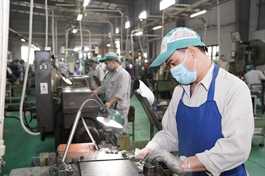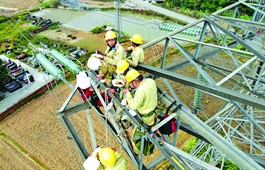Phu Tho eyes 56 new 3-star OCOP products for 2022
Phu Tho eyes 56 new 3-star OCOP products for 2022
The northern mid-land province of Phu Tho is striving to have 56 more products meet the One Commune, One Product (OCOP) programme standard as a three star or higher manufactured goods ranking.

The figure would raise the province’s total number of OCOP goods of three stars and above to 134 by the end of 2022.
Also toward the year’s end, Phu Tho aims at forming a stable and effective supply chain that connects to supermarkets and shopping malls for distribution. The provincial administration will also help with the building of up to two more points of OCOP introduction, promotion and sale that are linked to the provincial tours and festivals.
To that end, the province has requested competent agencies, sectors, and localities involved come up with creative ideas, focus on improving the quality of existing products and developing new ones.
It is also necessary to ramp up comprehensive advertisement activities, which cover organising OCOP trade fairs and exhibitions, and developing facilities for sale and promotion centres serving the products.
Currently, the province is implementing its sci-tech policies targeting OCOP products to increase related technological application, intellectual property rights protection, and digital transformation. This will help in the construction and effective management of the OCOP Phu Tho product brand via the development of management software, product evaluation and classification.
Phu Tho is also assisting OCOP firms to advertise their goods on a wide range of e-commerce platforms such as giaothuong.net.vn; and nongsan.phutho.gov.vn.
Tran Tu Anh, deputy director of the provincial Department of Agriculture and Rural Development, said the products have contributed to leveraging the local farming sector, with product values, and incomes of households, cooperatives and businesses increasing continuously.
The official recommended that further attention be paid to communications in a bid to raise people's awareness about the development of commodity production following the value chain for improved competitiveness and exports.
According to Vu Quoc Tuan, head of the Phu Tho rural development sub-department, by this time, the assessment and classification of newly developed OCOP products is in line with the plan.
At the first round of OCOP product evaluation and classification in 2022 taking place on August 18, the provincial council for OCOP grading evaluated 30 product profiles of 11 districts, cities and towns.
As a result, there were seven products meeting the four-star standard, and 23 others ranked three stars.
In 2021, Phu Tho organised two rounds of product classification, with 57 products and product groups submitted to the provincial People’s Committee for recognition of OCOP product standards.
Up to now, the province has 78 OCOP products and groups of products, including 30 four-star and 48 three-star products. The local agriculture, industry and trade sectors organised many communications and promotion programmes in different forms and achieved good results.
The OCOP programme was initiated by the Ministry of Agriculture and Rural Development in 2008, based on Japan’s “One Village, One Product” and Thailand’s “One Tambon, One Product” programmes. It is an economic development programme for rural areas and also to help implement the national target programme on new-style rural area building.
OCOP products are made based on the combination of local resources, traditional culture, and advanced technology, thus promoting product diversification, quality, packaging, and origin traceability.
The programme has provided farmers with the chance to come together to form cooperatives, which in turn have enabled them to create goods with better quality, design, and packaging that meet higher standards and match market demand.
In the first half of this year, Phu Tho’s GRDP expanded some 7.8 per cent, and the province attracted three FDI projects worth US$226 million. The province was among the 20 cities and provinces nationwide with the highest disbursement rate of public investment.


























